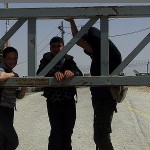
Filmed and produced by Cat Rabenstine for the Christian Peacemaker Teams in Palestine.
Life in the West Bank

Filmed and produced by Cat Rabenstine for the Christian Peacemaker Teams in Palestine.
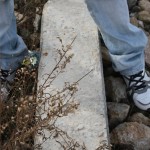
Today I took a walk through a friend’s village near Bethlehem. The sky was blue and spotted with clouds. It was chilly but the sun peaked through with surprising radiance.
First, he (let’s call him Ahmed) showed me a 4×4 inch cement track that follows one entire length of the village, coming within yards of the school. This tiny bit of cement will, maybe within the year, become part of The Wall built by Israel in this case to separate their settlement from the Palestinian village nearby.
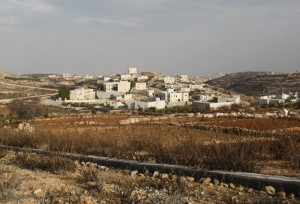
We walked up a dirt road to two demolished houses, the foundation of one home holding the remains of its former walls. The army demolished the houses, saying they posed a security threat. One family lived in a tent for a few months before building a new house.
Standing on top of the rubble, I saw the huge Israeli settlement homes looming above on the highest, closest hill. The houses looked huge and stable, capped with the ubiquitous red roof, a characteristic of Israeli settlement buildings.
We retraced our steps and walked the other way towards the paved settler-road to take pictures of the village from above.
The entire time we walked, the cement track followed us. Ahmed stood with each foot on either side of it, “One day, my left foot won’t be allowed in this spot,†he said.
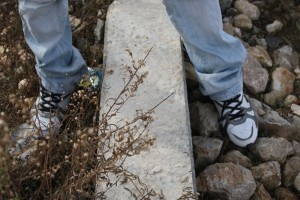
He hesitated for just a second before we had walked up this hill. He wasn’t supposed to walk on it. He said, “If soldiers come, they all know me by name. We will just run to the Palestinian side.â€
Once we reached the top of the hill, Ahmed pointed to three Israeli security cameras. All were pointed at us.
Each time I hear a story like Ahmed’s: homes demolished, livelihood wrecked, school children at risk, land taken, I consider my own family.
If it were my mother’s home being demolished or my brother being harassed daily by soldiers younger than him who haphazardly tote machine guns at their side, I’m not sure how I would react.
Would I try to defend them with violence?
Would I become depressed and feel hopeless?
Would I write about my situation, try to tell the world my story?
I don’t know what I would do, and I believe no one should have to answer this question. But I do know hundreds of Palestinians who have to respond to this question daily.
To read how “Ahmed†and his village have responded, click here.

BY: Mkhaimar Abusada for Bitter Lemons
The Arab Peace Initiative, which was adopted by the Arab League at its summit meeting in Beirut in 2002, is a comprehensive peace initiative first proposed by then-Crown Prince Abdullah of Saudi Arabia, and re-endorsed at the Riyadh summit in 2007. The initiative attempts to end the Arab-Israel conflict, which means normalizing relations between the entire Arab region and Israel in exchange for a complete Israeli withdrawal from all Arab territories occupied in June 1967 and a “just solution” of the Palestinian refugee problem based on UN Resolution 194.
One of the main elements of the Arab initiative stipulates: “The acceptance of the establishment of a sovereign independent Palestinian state on the Palestinian territories occupied since the 4th of June 1967 in the West Bank and Gaza Strip, with East Jerusalem as its capital.”
The issue of sovereignty and independence is of great interest and importance to Palestinians. They have not experienced independence or sovereignty in modern history. After World War I, Palestine fell under the British Mandate until 1948, and then Israel controlled 78 percent of mandatory Palestine. The West Bank was then annexed by Jordan, and Gaza was administered by Egypt, both until 1967. As a result of the June 1967 war, Palestinians in the West Bank and Gaza have been living under Israeli occupation.
The Oslo accords, signed in September 1993, led to the creation of the Palestinian Authority over parts of the West Bank and Gaza. They have deprived Palestinians of any elements of sovereignty or independence and kept the PA under total Israeli control. Palestinian movement from and into the PA territories is subject to Israeli approval. Commercial exports and imports are also subject to Israeli laws and regulations according to the Paris Economic Protocol.
“Sovereignty”, according to the Encyclopedia Britannica, is the quality of having supreme, independent authority over a geographic area, such as a territory. The concept has been discussed and debated throughout history, from the time of the Romans through to the present day, where the notion of globalization has motivated new debates. Although the term has changed in its definition, concept and application, the current notion of state sovereignty is often traced back to the Treaty of Westphalia (1648), which, in relation to states, codified the basic principles of territorial integrity, border inviolability and supremacy of the state. A sovereign is the supreme lawmaking authority within its jurisdiction.
Sovereignty means the right of the state of Palestine to become a full member of the United Nations General Assembly, adopt the UN charter, and conform to international law, the Universal Declaration of Human Rights and all other related UN documents. The state of Palestine will also be subject to its own constitution and legal norms.
“Sovereignty” for Palestinians means a total end to the Israeli occupation of the West Bank, Gaza Strip and East Jerusalem. It means that Palestinians alone will control their territory, air space, electromagnetic field and water within their own territory. It means the ability to enact laws and implement them over its citizens.
It also means the right of the Palestinian state to form its army and national security to defend territorial integrity and borders. It means the ability to defend the territory from outside enemies and aggression. But Palestine will not need to enter into military alliances, an act that violates the terms of peace and normalization with Israel.
Sovereign Palestine means the right to establish and conduct foreign and diplomatic relations with other countries to pursue peace and prosperity. No country can live in isolation from the community of nations. Countries cooperate in political, economic, security and cultural aspects, and Palestine shall be given the right to develop and pursue its diplomatic relations with Arab and Islamic–as well as western–countries.
It also means Palestine’s ability to administer and oversee the holy sites within its territory. Palestine is home to the three major religions, thus requiring it to respect and protect Jews, Christians and Muslims. Religious sites, especially those in East Jerusalem and Bethlehem, must be accessed by their respective observers. Palestine must establish a ministry to preach peace, tolerance and acceptance among all people.
Sovereign and independent Palestine will not live in a vacuum. It will be part of the community of nations that respects international law and human rights, and will do all it takes to pursue peace, security and prosperity in the region.
–Published 5/1/2011 © bitterlemons- api.org
Mkhaimar Abusada is a professor of political science at Al-Azhar university, Gaza.
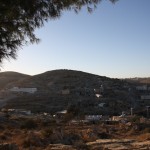
CPTnet Digest
4 January 2011
A newsletter written by members of Christian Peacemaker Teams and Operation Dove.
Operation Dove (Nonviolent Peace Corps of Association “Comunit” Papa Giovanni XXIII) and Christian Peacemaker Teams (CPT) announce the publication of the 2009-2010 report on the Israeli military escort to the Palestinian schoolchildren from the villages of Tuba and Maghayir al-Abeed.
An average of eighteen Palestinian children from the villages of Tuba and Maghayir al Abeed attend school in the neighbouring village of At-Tuwani.
To reach school, the children typically use the primary road that connects their villages with At-Tuwani and passes between the Israeli settlement of Ma’on and the Israeli outpost of Havat Ma’on (Hill 833).
Since 2001, Israeli settlers from Havat Ma’on have routinely attacked the children on their journey to and from school, but it was not until November 2004 that Israeli authorities established a daily military escort.
Despite the Israeli military escort, the children have been victims of violence 104 times between November 2004 and June 2010.
The soldiers carrying out the escort have at times failed to protect the children and have frequently arrived late, causing the children to wait, sometimes for hours, before and after school.
During the 2009-2010 school year, children missed almost twenty-seven hours of school and waited fifty-three hours for military escort after school.
In addition, the soldiers regularly failed to provide a complete escort of the children, almost always leaving the children to walk unescorted beside settlement buildings, in an area where settlers have attacked them.
Despite the children’s right to access education, the military fails to provide a consistent escort for the children. When the military does not arrive, the schoolchildren must take alternative routes that take up to two hours by foot through a rocky, hilly landscape. Furthermore, settlers attack the children and their relatives on these longer paths.
Members of Operation Dove and Christian Peacemaker Teams have had a continuous presence in the village of At-Tuwani since 2004 and daily monitor the military escort of the schoolchildren.
The report, “The Dangerous Road to Education. Palestinian Students Suffer Under Settler Violence and Military Negligence” is available as a PDF. Click here for the PDF document.
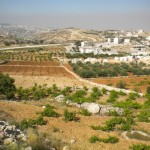
Palestine Today: A Reality of Justice Denied
Media with Conscience
On December 24, Mondoweiss co-editor Adam Horowitz wrote:
“Israeli military kills 20-year old Gazan for herding animals too close to buffer zone.”
On December 23, Israeli forces shot and killed Salama Abu Harhish without warning while herding sheep and goats in Beit Lahya. Civilized nations don’t murder nonviolent civilians in cold blood, this time leaving a widow and day-old unnamed baby.
What “democracy” thrives on violence, spurns peace, and wages preemptive wars like Cast Lead. Besides America, only Israel, a global menace like its Washington paymaster/partner, together with Britain the real axis of evil.
Commemorating Operation Cast Lead in Gaza
The Palestine Telegraph
Gaza, (Pal Telegraph) – A demonstration commemorating the beginning of “Operation Cast Lead†was held Tuesday in the Gazan city of Beit Hanoun. Families of victims were in attendance, as were 5 International Solidarity Movement activists. Two years have passed since the Israeli attacks on Gaza, which killed over 1400 people in just 23 days. The vast majority of victims were civilians, including 350 children, according to the United Nations and other major human rights organizations.
The Local Initiative demonstration began at the railway street in Beit Hanoun, near some of the most horrendous attacks which occurred during the land, air and sea bombardment of Gaza. The group of around 40 continued into the ‘buffer zone’ to within 100m of the Israeli border, holding flags and photos of children killed two years ago. During the 23-day attack, none of Gaza’s 1.5 million inhabitants (including 800,000 children) were safe.
In Bethlehem, shepherds watching their flocks by night are a dying breed
The Guardian
If an “angel of the Lord” were to appear in the sky over Bethlehem today, there would be scarcely any shepherds keeping watch over their flocks to witness the scene.
Spending nights and days in the fields herding sheep has become an almost impossible task for the fast-diminishing community of shepherds in this biblical Palestinian town.
Jewish settlements, Israeli army checkpoints, closed military zones and the West Bank separation barrier have reduced the grazing area to such an extent that a growing number of Bethlehem shepherds have been forced to give up their traditional livelihoods. “I miss the freedom of the wilderness. Everything is different now. We can barely move,” says Adel Alsir, a 35-year-old Palestinian who herds his flock less than 100 metres from a biblical site known as the shepherds’ fields.
On Palestine, the US is a rogue state
The Guardian
On 17 December, Bolivia extended diplomatic recognition to the state of Palestine within its full pre-1967 borders (all of the Gaza Strip and the West Bank, including East Jerusalem). Coming soon after the similar recognitions by Brazil and Argentina, Bolivia’s recognition brought to 106 the number of UN member states recognising the state of Palestine, whose independence was proclaimed on 15 November, 1988.
While still under foreign belligerent occupation, the state of Palestine possesses all the customary international law criteria for sovereign statehood. No portion of its territory is recognised by any other country (other than Israel) as any other country’s sovereign territory and, indeed, Israel has only asserted sovereignty over a small portion of its territory – expanded East Jerusalem – leaving sovereignty over the rest both literally and legally uncontested.
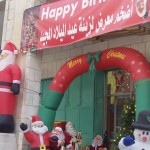
This week, Christmas stores have popped up throughout Bethlehem.
My favorite Christmas goodies
1. Â Para-gliding, blow-up Santa
2. Â Mix-CD of Arabic and international Christmas tunes, homemade by the shopkeeper himself and on sale for $3.
3. Â A tree that showers itself with fake snow.

CPTnet Volume 36, Issue 3
A newsletter written by members of the Christian Peacemaker Teams
This autumn, a local businessman alerted three CPTers to the presence of a group of soldiers outside the Ibrahimi School, located in the heart of the Old City.
Upon arrival, the school principal informed CPT that a settler boy, around seven years old, had accused two Palestinian boys from the Ibrahimi School of throwing a rock at him.  Soldiers wanted to enter the school with the settler child to identify and arrest the Palestinian boys, and the school principal responded by saying they would first need to get
permission from the Palestinian Minister of Education.
Over a period of three hours, fifty Israeli soldiers, twenty settlers and Israeli police gathered outside the school. When the Palestinian Ministry of Education told the soldiers that they could not enter the school, the Israeli army disregarded his decision and entered the school with the settler boy in tow.
Two Palestinian boys under the age of eighteen were arrested in front of their peers and taken to the local police station. The Israeli army and police informed the Minister of Education that these arrests were necessary for “maintaining the peace,” because the group of settlers gathered outside the school had threatened to remain and harass the school
children if the police did not arrest the Palestinian boys.
Over the years, people on the Hebron team have witnessed settler children attack Palestinian children many times, and to the best of our knowledge, no police officer has ever taken a Palestinian child into an Israeli school to point out his/her attackers.  Indeed, when adult Palestinians and internationals provide documentation of settler children attacking Palestinian children and adults, police and soldiers usually dismiss them rudely.
The Ibrahimi School incident not only shows the lack of impartiality on the part of the police, but also that settler accusations supersede preserving the educational environment of Palestinian children.
The entry of soldiers into educational institutions signifies to children that schools are not safe places for them, thus creating further barriers to education.
The young settler boy that made the rock throwing accusation was prompted by his father and other adult settlers to demand entry into the Ibrahimi School during school hours. Settler adults brought a number of settler children with them to the school and refused to obey the soldiers instructions for children to leave the scene.
Children need safe environments where they can learn and grow. Unfortunately, what CPT observes here in Al-Khalil is that children, both Palestinian and Israeli, are not being brought up in a spirit of love or respect for others.
The Israeli authorities in this area are not preparing children for a life of peace, tolerance, and equality — a life that all children deserve.
For footage of the Ibrahimi school incident, click here

PRINCETON, N.J. — Princeton University students voted Monday in a referendum by a pro-Palestine student group on whether to expand the school’s hummus offerings.
The student group Princeton Committee for Palestine wants university-run stores to offer alternative brands of the Middle Eastern chickpea dip because they say the only brand available is linked to human rights violations.
The brand, Sabra, is owned by PepsiCo and Strauss Group, and Strauss’ website says it supports members of the Israeli military.
The group has been pushing for the university to boycott and get rid of its investments in companies that make donations to parts of the Israeli military that it says violate human rights.
Ilya Welfeld, a spokeswoman for Sabra, which has headquarters in Queens, N.Y., and Richmond, Va., said Sabra only makes donations in North America — and none of them are political.
But the Strauss Group, an Israeli food conglomerate, says on its website that it makes contributions for the “welfare, cultural and educational activities” of members of the Israeli military.
Students seeking the referendum made it happen by collecting 200 signatures. If the effort is successful, it would mean the student government would make a formal request to the Ivy League school’s administration to provide additional brands of hummus.
The pro-Israel student group Tigers of Israel opposes the referendum. The group says the allegations raised by the other side are sketchy.
The results of the vote are scheduled to be released Friday.
The referendum was originally scheduled for last week but was canceled then because of a goof: The wording called for Sabra hummus not to be offered at university stores rather than for additional products to be sold, too.
Read the original article on wsj.com here